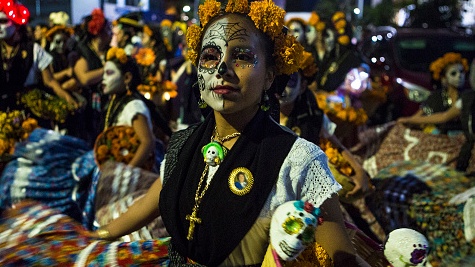The Congressional Hispanic Caucus (CHC) has installed its first official Day of the Dead altar, which has been dedicated to those who have died in U.S. custody while attempting to enter the country.
Day of the Dead, or Día de Los Muertos, is a mixture of Spanish Catholic and Native American traditions. It celebrates the memory of the deceased with cemetery visits and memorial altars, which include offerings representative of the objects and activities that those honored enjoyed in life.
Honored the children and families who’ve died seeking refuge in America with a rosary as an ofrenda for the #DiaDeLosMuertos altar in the Capitol.
My heart was heavy as I reflected on their sacrifice in search of the American Dream. We must continue honoring them with action. pic.twitter.com/PLddZbrDbV
— Rep. Sylvia Garcia (@RepSylviaGarcia) October 30, 2019
"This tradition brings family and friends together to remember those who have died and typically includes an altar ornamented with gifts, food and toys," said CHC Chairman Rep. Joaquín Castro in a statement reported by The Hill. "We are proud that our altar stands in the U.S. Capitol this week so we can collectively uplift each of their stories and remember the brave folks who sought a better life in our country."
The main altar includes 14 pictures of the people — mostly minors — who died in U.S. custody, but some CHC members have placed separate altars in their offices. Rep. Raúl Grijalva, who installs a Día de Los Muertos altar in his office every year, erected one this year that included offerings to the late civil rights icon César Chávez and former Rep. John Conyers Jr., who died Sunday.
"It's important, culturally and historically, spiritually, whatever your higher power is, I think it's important because it's a connection to people that have passed, a remembrance, and I think it's good not to forget," Grijalva told the Hill.
Despite the cultural significance of the day, Rep. Nanette Diaz Barragán admitted to the Hill that she learned of the tradition of setting up altars from the Pixar film Coco, which has a plot centered on the holiday.
"I think it's sad that we have to do this," Barragán said about building an altar for dead migrants rather than the more traditional approach of celebrating deceased loved ones. "We have to continue to honor them and their memory to remind ourselves of the fight that we have now and need to continue to forge ahead. But we shouldn't have to do ofrendas for migrants that are dying on U.S. soil."
Altars dedicated to significant figures, co-workers, family members and loved ones will be on display until the celebration's end on Saturday.
